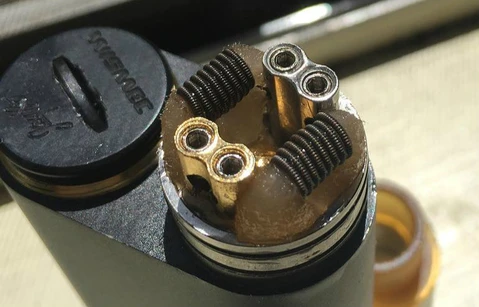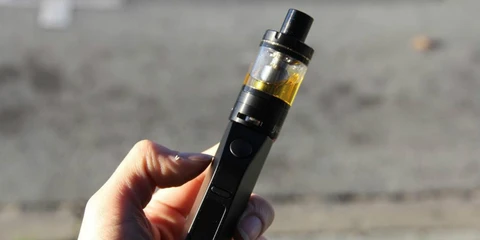
We change our coils frequently due to the coil gunk, which is annoying. In addition, the cost of coil replacement isn’t cheap. It really depends on how often you change the coil. Do you know what exactly a coil gunk is? What’s the reason that the coils become gunky? Is there anything you can do to stop it?
What is Coil Gunk?
First, check your coils. If you see something dark buildup around the coils and clog the wick, it’s called “Gunk” by all vapers. This Coil Gunk often disturbs the taste of your e-juice, affects the ability to vape the e-juice, and reduces the lifespan of coils. As you continue vaping, you experience a bad taste or a burned flavor in your mouth. You would have to change your coil more frequently.

What’s the reason why coils can clog up (become gunky)?
In order to avoid these unpleasant consequences, we have analyzed the reason for Coil Gunk in the first place.
Sweeteners
The main cause of coil gunk is the sweeteners, which is natural and artificial substances that provide sweetness in food and beverages. The most popular sweeteners used in e-liquids are Sucralose and Ethyl Maltol (Cotton Candy). The newest used sweetener is Erythritol, which is made from sugar-alcohols.
Sugar and carbohydrates are usually not easy to vaporize. To the end, they are left on coils and get burned. For example, many (naturally extracted tobacco) NET electronic liquids contain sweeteners, which will eventually cause the coil to burn.
Dark e-liquids
In general, darker color e-juice also has more chance to cause coil gunk since the light-color e-juices have much less sweeteners than the darker-colored e-juices. Not only the color of the liquids is important but also the sweeteners.
Higher VG e-juices
The Vegetable Glycerin is also known as VG-Based liquid. The higher VG component in e-juice, the thicker it will be, which makes clogging more likely in general due to the sugar it contains. The PG stands for propylene glycol and it’s thinner than VG. Despite that, some flavors have a high sugar and can cause burning on the wick.
If you’re using a basic or standard coil, they are ideally designed for a 70PG/30VG blended ratio. The standard coils are with a minimum resistance of 1.5ohm.
Power Setting

If you set your atomizer at a high power and take a long puff, it is likely to clog coils. Therefore, it directly burns your wick than gunk necessarily. However, they have the same results.
What should I do to avoid Coil Gunk?
It’s impossible to completely avoid the gunky situation. However, the most common causes are easy to avoid, at least you can minimize them by making small changes to your vaping habits. To the end, you can reduce the possibility of being clogged.
Change your e-juice flavor

If you would like to prevent coil gunk, you can try to switch e-juice flavors. The most important thing is to choose the e-juice that contains less sweeteners. For example, Naked 100 E-Liquid, BLVK E-Liquid, and AQUA E-Liquid are well known for their clean and natural-tasting. We would recommend starting with Tobacco flavors and Menthol flavors.
Switch to a lower-VG e-juice
If you are struggling to switch the flavor, another way is to switch to a lower-VG e-juice, which may help reduce the issue. Please remember anything with less than 70% VG should reduce the problem substantially.
Most Nic Salts E-Liquid features blend ratio of 50VG/50PG, which can be helpful for the issue.
§NKD 100 Salt
§I Love Salts
§Twist Salt
§7 Daze Salts
§Yami Salt
Naked 100 E-Liquid has rename its flavor, and also change it blend ratio to 65VG/35PG, which is also a good choice for customers
Turn the power down
Lowering the power setting and puff time can reduce the risk of clogging coil. If the coil does not last long, you can reduce the power and decrease the puff time to extend the life of the coil. It’s a worthwhile way to try.
Conclusion
Please remember that every coil will still get gunky eventually. However, if you’re willing to avoid coil gunk, you might try to choose e-liquids with less sugar and lower VG. Those tips help to reduce the gunk of coils in most cases, which lasts the life of coils and reduces the time for replacement.
